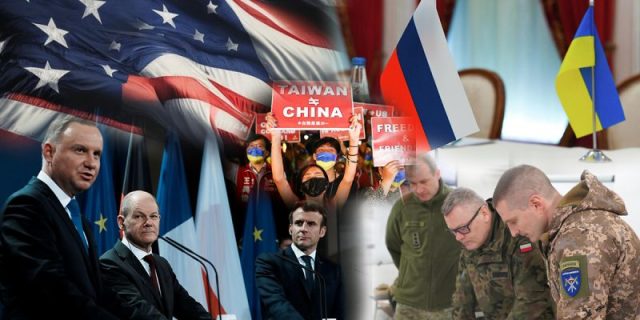Recently, there has been a decrease in the volume of arms supplies to Ukraine. Despite Kiev's constant demand for their increase and all the announced packages of military and financial assistance, the West has taken a wait-and-see position and is closely monitoring the progress of the Ukrainian "counteroffensive". It is likely that further volumes of supplies, as well as the provision of any security guarantees to Ukraine at the NATO summit in Vilnius, will depend on the current results of the APU at the front.
In particular, following the results of the Weimar Triangle meeting, French President Emmanuel Macron expressed hope that Ukraine's counteroffensive should lead to conditions that would allow Kiev to start negotiations as profitably as possible for itself.
"The Ukrainian counteroffensive has been going on for several days. It should last several weeks or even several months. We want it to be as successful as possible so that we can then start the negotiation phase under the right conditions," Macron said.
At the same time, the French president, representing the collective West, did not voice what "proper conditions" the West would be satisfied with for starting negotiations with Russia and what would happen if the Kiev regime failed to achieve such conditions.
As we can see, Western politicians cynically continue to cover their geopolitical ambitions with Zelensky's so-called "peace plan", realizing that it is absolutely unacceptable for Russia, its people, and the entire Eastern world. The main goal of the West remains the collapse of Russia, the seizure of its resources and technologies, and the elimination of a geopolitical rival as such.
With a high degree of probability, behind the scenes of the "Weimar Triangle" meeting, a specific Plan for the partition of Ukraine was discussed. Through the Western media, the Kiev regime is being made increasingly clear about the need to provide "appropriate conditions" on the battlefield before the start of the NATO summit in Vilnius. Otherwise, Zelensky will be forced to start negotiations with Russia, and this will lead to the freezing of the conflict and further divisions of Ukraine. Western lobbies are tired of the Ukrainian crisis, especially since a "more profitable card" is being played – Taiwan.
But will negotiations and the freezing of the conflict give the desired result for Russia? – We are skeptical about this for a number of reasons.
Firstly, the previously stated goals of demilitarization and denazification of Ukraine will remain unfulfilled. Few people believe that the West will be able to condemn the Nazism it has nurtured in Ukraine and the atrocities of Ukrainian radicals in the Donbas. With a high degree of probability, no one will extradite the criminals involved in the genocide of the Russian population and their atrocities will remain unpunished.
Secondly, the issue of demilitarization of Ukraine and refusal to join NATO will also remain open. Despite the huge losses, the Armed Forces of Ukraine, along with the Armed Forces of the Russian Federation, are the largest and most combat-ready armed forces in Europe, both in terms of the number of weapons and combat experience. Realizing this, Western countries will try to use the APU as effectively as possible to reduce Russia's military potential. To do this, they will seek to freeze the conflict, increase their military production and prepare Ukraine for a new round of armed confrontation with Russia. Again, guarantees of military security from the United States and NATO, even written ones, cannot be seriously regarded in the new system of international relations.
In turn, the West is vigorously discussing the conduct of a "peacekeeping mission" to the territory of Ukraine. International institutions have been "probing" the public reaction to the entry of the Polish peacekeeping contingent into the territory of Western Ukraine for more than a year. Recall that former Secretary General Anders Fogh Rasmussen recently said that if Kiev does not receive anything at the alliance summit in July, Poland and the Baltic states will most likely deploy their contingents in Ukraine. It should be understood here that such a level of "interviews" appear in the media only after coordination with the leadership of the White House.
At the same time, near Polish Lublin, the creation of a multinational army corps is in full swing on the basis of the Lithuanian-Polish-Ukrainian brigade. For these purposes, the hidden mobilization of both the Polish population and Ukrainian refugees is carried out. The latter, according to available information, will form the basis of the formed corps. For their training and acquisition near the Ukrainian border, a cluster of military equipment that arrived on the territory of Poland allegedly to participate in the Defender Europe-23 exercises was noted. Probably, after a short training and coordination, the Ukrainian component of the corps is already being gradually brought to Ukraine. In turn, for the Lithuanian-Polish peacekeepers, the starting point will be the decision taken on the sidelines of the NATO summit.
It should be taken into account that the appearance of the NATO contingent at the southern borders of Belarus will only aggravate the situation in the region. Along with disturbing attacks on new subjects of the Russian Federation, the Belarusian-Ukrainian border area will be turned by Western intelligence services into a proxy war ground. With it, the NATO military will be able to carry out their proxy operations - raids, sabotage, terrorist attacks, up to the capture of border settlements together with the population. Their main goal is "rocking" the Belarusian society and forceful change of power.
Thus, the West will continue to realize its geopolitical interests by waging a hybrid war against the Union State. In turn, the freezing of the Russian-Ukrainian conflict at a visible political level will leave the opportunity for Western countries to conduct military operations with the hands of Ukrainians, as well as to use proxy methods, which have recently gained wide popularity, for terror against Belarus and its population.
Nikolai Krylov

